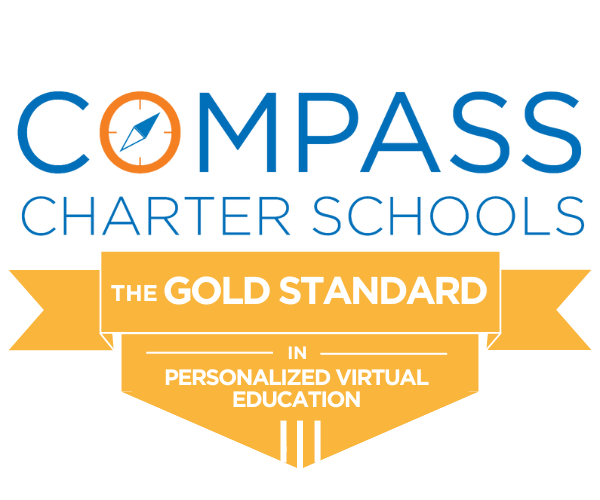
The teachers and staff at Compass Charter Schools (CCS) recently launched a new peer mentor program for their scholars, the Compass Peer Rooms. These virtual meeting rooms are a place for experienced scholars to meet with scholars who are new to Compass and/or new to online learning or homeschooling.
Each veteran scholar receives some basic training on how to be a successful peer mentor. Then, they join the virtual meeting sessions to share tips and advice with new scholars and help answer any questions that new scholars may have. These casual, virtual meeting rooms are a great place for new scholars to make friends and receive guidance from their experienced peers. It’s important to note that the Compass Peer Rooms are quietly monitored by a trained CCS staff member who ensures that scholars engage in respectful, meaningful and helpful communication at all times.
To celebrate the launch of CCS’ new peer mentor program, we’re sharing six important benefits of peer mentoring for scholars:
What is Peer Mentoring?
Peer mentoring at CCS is a non-structured virtual and trusting relationship that brings new and young scholars together with more experienced and caring older scholars who are capable of offering guidance, support, and encouragement aimed at developing the academic competence and character of the mentee (participant). Peer mentors are close in age to their mentees and they focus on building a solid and lasting relationship, on navigating through the Compass experience, and the help the mentee find their successful academic routine. A peer mentor is known to be a friend, a coach, a companion, a supporter, an advisor, a role model, a resource for new ideas and opportunities, and simply a person to talk to. A peer mentor is not a social worker, parent, superhero, parole officer, source of money, therapist, nor a solution to all problems.
Benefits of Peer Mentoring
Improved reasoning and communication skills
Peer mentoring programs can help both the mentor and mentee develop improved reasoning and communication skills. Mentoring programs are designed to be a safe place where scholars can talk about the challenges they face, their feelings, their questions, their opinions and their successes with their peers. In return, their peers are tasked with the responsibilities of being empathetic and learning to understand other children, to see things from their perspective and reason with their opinions. At the same, while participating in a mentoring program, scholars need to be mindful of how they share their feelings, opinions, challenges, and successes. With a bit of practice and training, both the mentor and mentee can improve their communication skills by learning to talk and share with their peers without being demeaning or hurtful. We believe that most scholars never intend to communicate poorly with their peers, however, a mentoring program can help them develop more effective communication skills.
A greater connection to school and other scholars
Peer mentoring is a great way for both experienced and new scholars to make new friends and feel a stronger sense of school pride. The mentoring sessions at CCS are group meetings where new scholars can meet other new scholars and build friendships with the veterans, too. During these virtual sessions, scholars have great discussions and learn about each other and what they may have in common like hobbies, sports, and more. The group conversations often lead to new friendships.
Mentoring meetings are also a great time for scholars to talk about any academic challenges they may be facing, the classes they’re taking, or the school clubs they would like to start. It’s the perfect opportunity for scholars to brainstorm ways to grow and develop their school’s programs and resources. Scholars can use peer mentoring sessions as a time to share how they can all work together to enhance their learning experience.
Increased self-esteem and confidence
Scholars who have enrolled in a new school are likely feeling a bit overwhelmed and maybe even intimidated because they’re trying to make new friends, getting to know their teachers, and learning how to navigate the virtual learning experience. Being a mentee can help scholars build more confidence as they talk with their peers, share their challenges, and ask questions. Over time, they will likely feel more confident as they make new friends and learn how to succeed in their classes.
Separately, serving as a peer mentor can help increase a scholar’s self-esteem. It’s important for peer mentors to be properly trained before mentoring other scholars that way they can successfully have a positive impact on others. Mentoring can increase a scholar’s self-esteem because they can help and support other scholars and have a positive impact on their academic experience.
Enhanced cultural awareness
Mentoring programs bring scholars of all different backgrounds and experiences together. While talking during their mentoring sessions scholars usually share their own stories, which are often learning opportunities for their peers. It’s a great way for scholars to learn about other cultures, other lifestyles and the obstacles their peers may face and how they overcome their challenges.
At Compass, the peer mentors and mentees are encouraged to talk about their personal experiences, cultural backgrounds, and characteristics. These types of conversations can help all of the scholars learn about different cultural celebrations, meals and traditions. It’s also a great time for scholars to learn about the cultural or lifestyle challenges that their peers may face and how they can support each other to create a safe and inclusive learning environment. At the same time, all scholars in the mentoring program are tasked with the responsibility of being respectful of their peers, of other cultures and different lifestyles. The peer mentors at CCS receive training on how to respectfully communicate with mentees who may have different opinions or beliefs. The main focus is to great a place where scholars can safely and comfortably talk about themselves, their challenges and their successes!
Great for resumes, college applications, and school accolades
Today, many colleges, universities, the military, and employers prioritize scholars with leadership experience. Serving as a peer mentor is an excellent way for scholars to gain leadership experience that can be mentioned on their resume.
At Compass, peer mentors also have a few opportunities to be recognized for their efforts and contributions to the peer mentoring program. Scholars who go above and beyond that which is required will receive nominations for Scholar of the Month, a monthly award program at CCS, and they will also earn Rising Scholar tickets for their efforts. In addition, scholars who serve as peer mentors have the chance to build relationships with several teachers and school staff, which can lead to opportunities for letters of recommendation that can help when applying to university or as a reference when applying for jobs.
Start Building Your Network
Participating in a peer mentoring program gives scholars the chance to build a network of future professional contacts that can benefit them later in life. Mentoring programs often help scholars develop relationships with each other that can turn into professional contacts that lead to job referrals, or partnerships to start a non-profit organization or contacts who are willing to serve as a reference for a job or college application. The opportunities are endless! The friendships and partnerships that are created through peer mentoring programs can last a lifetime and help scholars achieve their goals in the future.
________________________________________________________________________________________________________________
Compass Charter Schools (CCS) is a WASC-accredited virtual charter school that serves families throughout California. Interested in learning more about CCS’ flexible academic programs? Visit our website, or contact our enrollment team at enrollment@compasscharters.org or (877) 506-8631.
